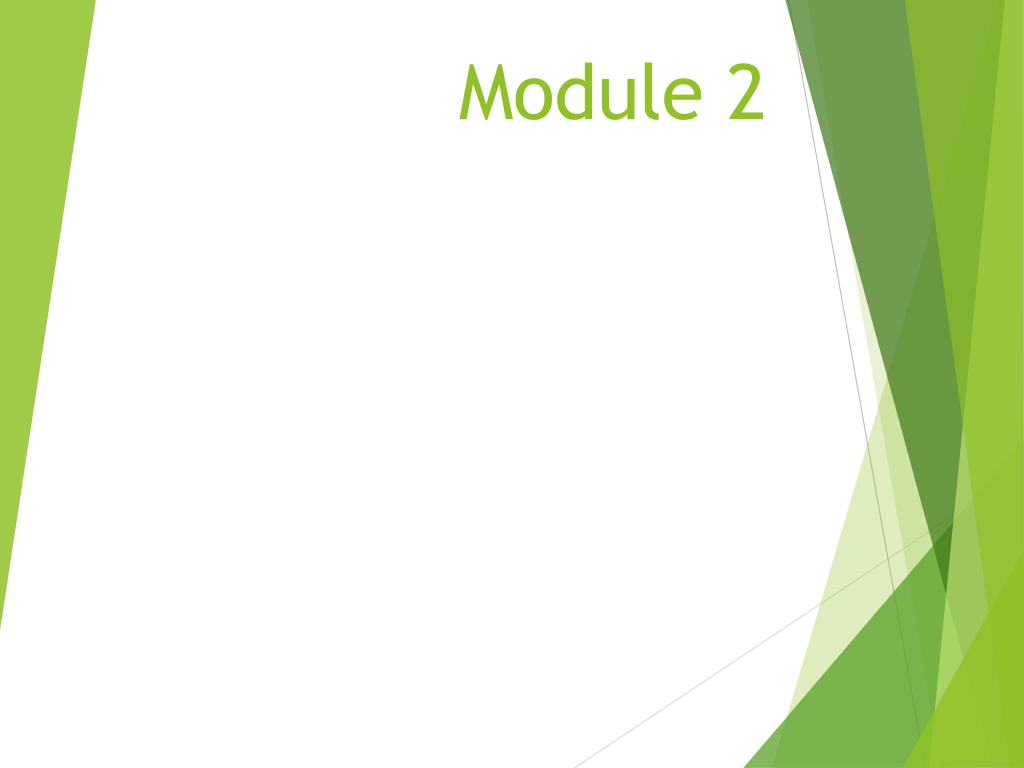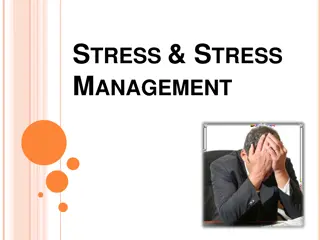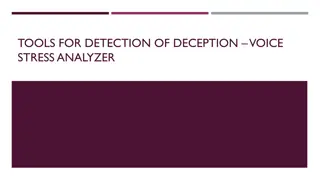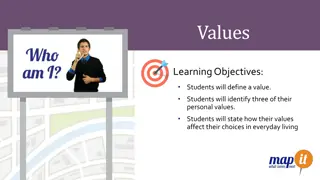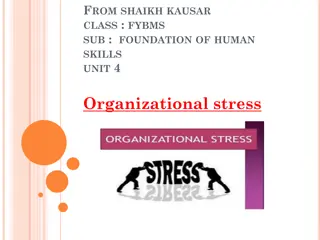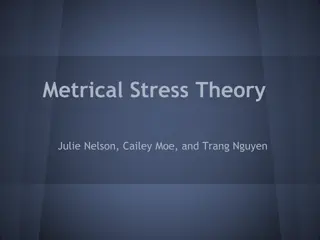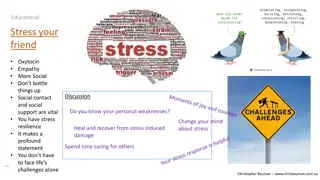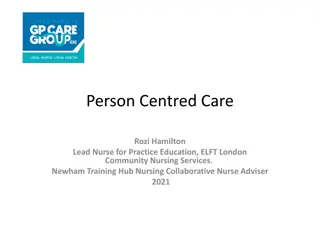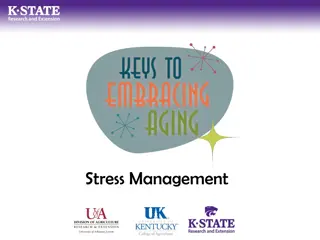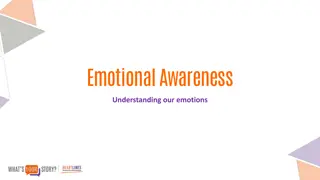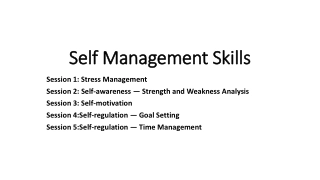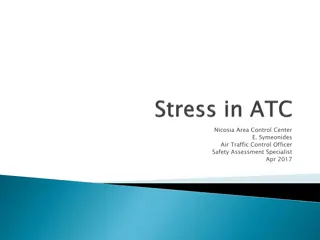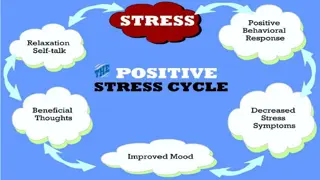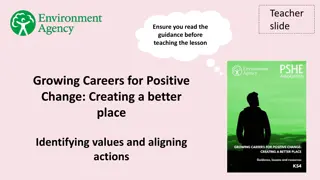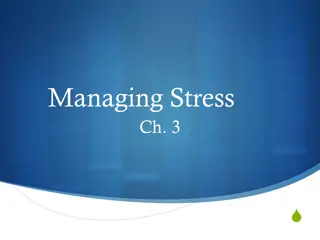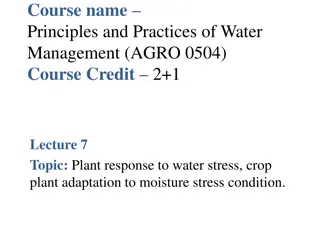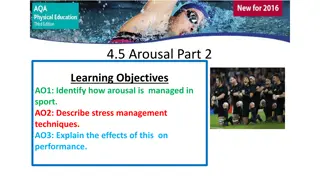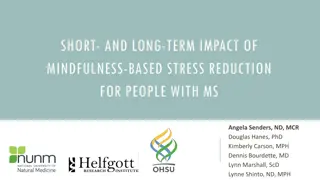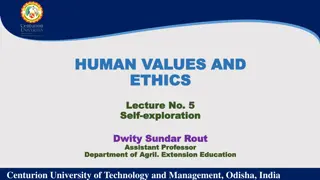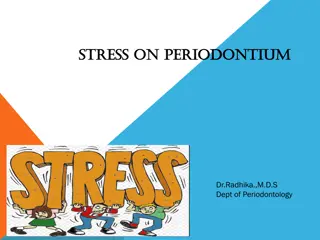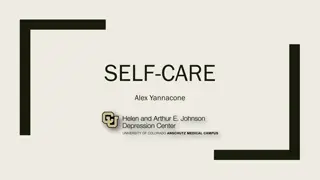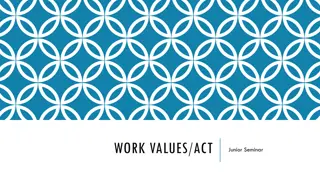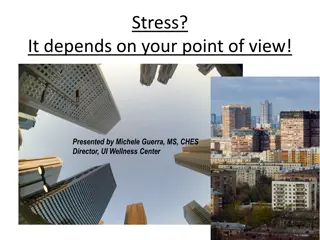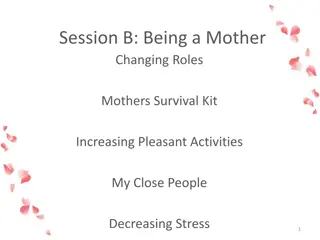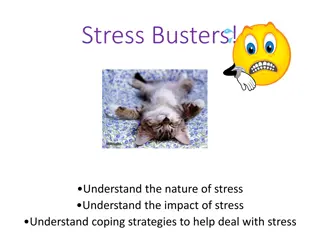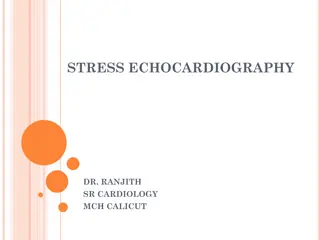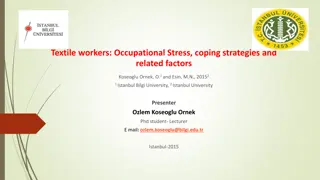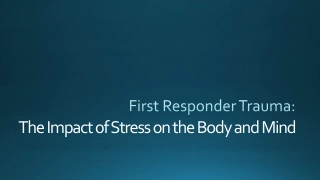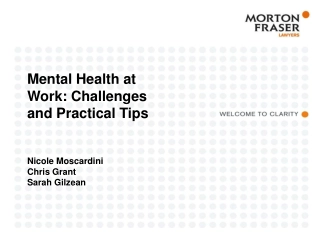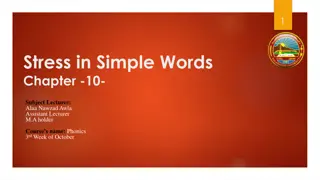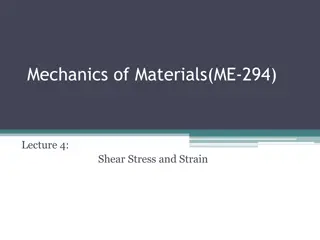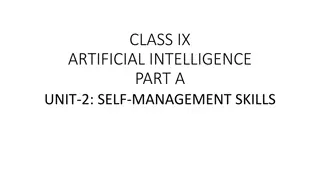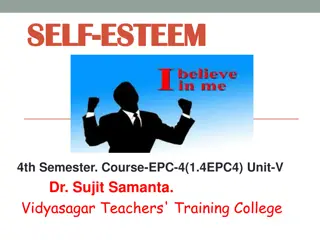Self-Awareness, Stress Management, and Human Values: Tools for Personal Development
Self-awareness involves being conscious and accepting of oneself, while stress management techniques help in coping with everyday challenges. Understanding human values is essential for promoting well-being and making ethical decisions. Tools such as questionnaires, journaling, and meditation aid in self-improvement. Stress management is crucial for maintaining a healthy balance in life, identifying stressors, and implementing effective coping strategies. Embracing self-awareness, managing stress, and upholding human values contribute to personal growth and overall well-being.
Download Presentation

Please find below an Image/Link to download the presentation.
The content on the website is provided AS IS for your information and personal use only. It may not be sold, licensed, or shared on other websites without obtaining consent from the author. Download presentation by click this link. If you encounter any issues during the download, it is possible that the publisher has removed the file from their server.
E N D
Presentation Transcript
Module 2 Self-awareness: definition, need for self-awareness; Coping With Stress and Emotions, Human Values, tools and techniques of SA: questionnaires, journaling, reflective questions, meditation, mindfulness, psychometric tests, feedback. Stress Management: Stress, reasons and effects, identifying stress, stress diaries, the four A's of stress management, techniques, Approaches: action- oriented, emotion-oriented, acceptance- oriented, resilience, Gratitude Training, Coping with emotions: Identifying and managing emotions, harmful ways of dealing with emotions, PATH method and relaxation techniques. Morals, Values and Ethics: Integrity, Civic Virtue, Respect for Others, Living Peacefully. Caring, Sharing, Honesty, Courage, Valuing Time, Time management, Co operation, Commitment, Empathy, Self-Confidence, Character, Spirituality, Avoiding Procrastination, Sense of Engineering Ethics.
SELF AWARENESS Being aware of the self Conscious and on going attention to oneself Evenly hovering attention By Sigmund Freud. In a wider sense, Self Awareness involves Metacognition Being aware of your thoughts Metamood Being aware of your feelings Objective Self Assessment Accepting yourself Being Confident
Need of self awareness It is a key cornerstone of intelligence. Ability to monitor our emotion and thoughts. It is a key to understand our self better, being at peace .
HUMAN VALUES A value is an enduring belief that influence our choice in life to promote well being. Values are the principle that reflect ones judgment. Ethical values that governs virtuous behavior
TOOLS AND TECHNIQUES Questionnaire Journaling Reflective questions Meditation Mindfulness Psychometric test Feedback
STRESS MANAGEMENT It is the reaction of the body to any change that require an adjustment. It is the normal part of life. SOME COMMON REASONS Being unhappy in your job. 1. Having a heavy workload . 2. Working long hours. 3. Working under dangerous conditions. Etc... 4.
EFFECTS Stress usually affects human body both positive and negative. Getting a job promotion , greater responsibility , keeping us alert and ready to avoid danger are positive stress. Stress become negative when a person faces continuous challenges without relief or relaxation between challenges.
HOW TO IDENTIFY STRESS? Psychological signs Emotional sign. Physical sign. Behavioral sign. Stress diary.
FOUR AS OF STRESS MANAGEMENT It is a stress management tool kit by mastering four strategies for copying with stress: Avoid, Alter, Accept, and Adapt. AVOID 1.Take control of your surroundings 2. Avoid people who bother you. 3. Learn to say NO. ALTER 1.Respectfully ask others to change their behavior. 2. Communicate your feelings openly. 3. Manage your time better. 4. State limits in advance.
ACCEPT Accept the Situation 1. Practice forgiveness 2. Acknowledge your feelings and emotions 3. Maintain positive outlook. 4. ADAPT Adjust your standards. 1. Stop negative thought patterns. 2. Adopt a different viewpoint. 3. Ask questions like 4. Will this matter five years from now? 1. How important is this ?? 2.
STRESS MANAGEMENT TECHNIQUES Five healthy techniques that psychological research has shown to reduce stress. Take a break. 1. Do breathing exercise 2. Cognitive reframing (Different way of looking at things) 3. Smile and laugh. 4. Get social support 5. Meditate 6.
ACTION ORIENTED HOW TO BECOME ACTION ORIENTED ? Read a book on the subject. 1. Take an online learning course on the subject. 2. Consult an expert. 3. Attend a workshop or course on aspects of this subject. 4. Manage for action. 5. Clarify accountability 6. Follow up 7. Address problems promptly. 8. Break complex assignment 9. Practice. 10.
Emotional oriented It is the opportunity to tailor the care to the individual needs of demanding elderly. The change for the care sector is to develop guidelines to determine which approach should be applied. With psychological therapy effect an increase in the well being and improve functioning in which patient.
Acceptance oriented In this something occurred in which we have zero power or control of our emotion. As a result the only way to deal with these situation is just learning to cope with stress and having control. Popular approaches are : Imagery- retreating to a stress free place in your mind. 1. Meditation consciously relaxing your body and focusing you thoughts one thing for a sustained period. 2.
3. Self hypnosis-fill your mind with positive statements and affirmation that build your confidence and ability to manage stress, 4. Physical relaxation- using deep breathing and muscle relaxation exercises.
resilience It is that ineffable quality that allows some people to be locked down by life and comeback at least as strong before. Finding a way to rise from ashes. Psychologist have identified some of the factors that make a person resilient such as positive attitude, optimism, the ability to regulate emotion and the ability to see failure as a form of helpful feedback.
Gratitude training Gratitude is correlate with positive emotional functioning, social relationship, and overall well being. Being thankful can also protect against mental health problems. Questions mainly referred are: 1. What do I take for gratitude? 2. What am I truly grateful for in my life? 3.What relationships and people am I thankful for? 4. Why am I lucky to live in the place that I live?
Identifying emotion Based on the way they make you feel, think and act. Questions include are: 1. What am I feeling now? 2. What are my senses telling me? 3. What is it that I want? 4. What judgments or conclusions have I made? 5. What is the emotion trying to tell me?
Managing emotion Understanding our emotion makes it possible makes it possible to manage them so that they work for rather than against you. If you are sad you can take steps to make yourself feel happy. Assuming you are in emotionally intelligent person how to manage hurtful comment First by recognizing that your pounding head and racing heart are signs that you are angry. Second by thinking your goal with regional to your relationship with your boss. Later after the meeting is done you can think about ways to handle to your boss tendency to put you down.
Harmful ways dealing with emotion Identify the emotion you are feeling. Try breathing relaxation techniques. Try a self soothing techniques. Try progressive muscle relaxation Try meditating or praying. Try throwing the negative thought away. Use positive imagery. Talk to a friend.
Path method It revealed perceived stress reactivity . Indirect effect on the appraisal of higher stressor intensity, lower perceived control, negative emotion.
Relaxation techniques Breath focus Body scan Guided imagery Mindfulness meditation Yoga , tai chi and qigong- three ancient arts combine rhythmic breathing with a series of postures. Repetitive prayer.
Moral values and ethics Integrity It is often a misunderstood value and that s the reason it is reasonable to ask whether it is always moral values. - It is the quality of being honest. -Having strong moral principles moral uprightness It relates to ones choice of action and consistency in application. - - it is often treated as a mean in order to serve a purpose. -
Civic virtues -It is the cultivation of habits important for the success of the community. - Examines the definition of civic virtue as morality or a standard of righteous behavior in relationship to a citizen's involvement in society. Civic virtue helps people understand their ties to the community and their responsibilities within it
1. Listen Listening to what another person has to say is a basic way to respect them. Everyone wants to have their say 2. Affirm When we affirm someone, we re giving evidence that they matter. That they have value. That they re important. And that they re worthy of respect. Simply affirming someone virtually guarantees that you respect them. To affirm someone, you just have to notice something positive about that person and verbalize this observation. You ve shown great determination over the past 2 years to get your business off the ground.
3. Serve Life on earth is about serving others. In fact, our professions, our careers, and our jobs should revolve around a desire to serve others. To give back to others. To use our talents and abilities to make life better for others. Serving shows that we care. And caring shows that we respect. Serving is an important element in showing respect.
4. Be Kind Though kindness and service are first cousins, they aren t identical. We can serve without being kind. But it s very difficult to be kind without serving. Kindness is an expression of respect. Respect for the fact that someone else is simply in need. We have all been in need. And what a relief it was when someone showed us kindness. Kindness is a tangible way of showing respect.
5. Be Polite It s appalling to witness the decline of politeness in the modern world. Whether it s on the highway, at the grocery store, in the parking lot, on the athletic field, on Facebook, or in political rhetoric polite discourse and interaction is rapidly becoming a lost art.
6. Be Thankful When someone does something for you that s beneficial. Or they say something to you that s helpful in some way. Or they honestly affirm you in some way that s important to you. You should thank them.
1. Seek to love, not control others. Ceasing to seek power over people and outcomes in your life is the first major step to living peacefully. 2. Find Your Inner Peace. At least once a day spend ten minutes in a peaceful place, such as under a shady tree or in the park, anywhere where you can sit quietly without distractions. Without inner peace, you ll feel in a constant state of conflict.
3. Moderate your convictions. Thinking in absolutes and holding to opinions without considering the viewpoints of others is a sure way to live a life without peace. 4. Be tolerant. Tolerance in all that you think and do will make a difference in your life and in the lives of others around you. 5. Be Peace. A peaceful person does not use violence against another person or animal (that includes small obnoxious insects too).
6. Reflection of thought. If someone hurts you physically or mentally, do not react with anger or violence. Stop and think. Choose instead to respond peacefully. 7. Seek forgiveness, not revenge. Live in the present, not the past. Dwelling on that which should have been and reliving past wounds will keep the negativity of the past alive and bring constant internal conflict.
8. Live in joy. Choosing to see the wonders of the world is an antidote to violence. It s hard to be violent against that which you see as beautiful, wondrous, amazing, and joyful. The greatest despair arising from wars comes from the destruction of innocence. 9. Be the change you wish to see in the World. Violence starts with your acceptance of its possibility as a solution. It s within yourself that you need to stop violence and become peaceful. Change yourself before you can change the world.
Caring can be a rich source of satisfaction in people's lives. It can be life-affirming. It can help deepen and strengthen relationships. It can teach you a multitude of skills and help you realise potential you never thought you had. Caring is something that will affect each and every one of us in our lifetime, whether we become a carer, or need care ourselves.
Sharing is the joint use of a resource or space. It is also the process of dividing and distributing. Sharing can actually mean giving something as an outright gift: for example, to "share" one's food really means to give some of it as a gift. Sharing is a basic component of human interaction, and is responsible for strengthening social ties and ensuring a person s well-being.
Honesty is not just about telling the truth. Its about being real with yourself and others about who you are, what you want and what you need to live your most authentic life. Honesty promotes openness, empowers us and enables us to develop consistency in how we present the facts. Honesty sharpens our perception and allows us to observe everything around us with clarity.
the ability to control your fear in Practical Steps to Cultivate Courage Acknowledge your situation and any fear around it. Admitting where you are and what you are afraid of even if only to yourself is always the first step toward progress. Example: I m SO nervous for this audition. I m afraid I won t get the part I want! Reality check: What are the possible outcomes? Are you attached to a certain outcome? Just like you try on clothes when you go shopping, try on how different possible outcomes will make you feel.
Ask: Where is the love? I find myself asking What is the most loving action I can take? a lot these days. What is the most loving thing I can do for myself & for others? What do I love more than I fear? Example: I LOVE to sing. I LOVE to act. I LOVE to dance. I love being a part of a show. Turn your love into the courage to face your fears. Take what energizes you and use it to help you deal with the possibility of disappointment.
